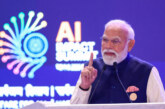By FGR Bureau
14 December, New Delhi: The Universal Declaration of Human Rights (UDHR), which is a comprehensive list of inalienable human rights agreed upon by all nations, celebrates its 75th anniversary in December. To commemorate the Declaration the International Labour Organization hosted an event, focusing on Freedom of Association on 13 December, as this year also marks 75 years of ILO’s fundamental Convention, Freedom of Association and Protection of the Right to Organize Convention, 1948 (No.87).
Freedom of association is a human right and a fundamental labour right, as elaborated in the UDHR. The further development of this right in the world of work is set out in the ILO’s International Labour Standards. India has actively committed to international human rights treaties, contributing to the global dialogue on human rights, and was a founding member of the ILO while also contributing to the development of the UDHR. Multi-layered crises, conflicts and challenges to the social contract and democratic institutions make the conversation about human rights and labour rights highly relevant and needed now more than ever.

Ramesh Krishnamurthy, Additional Secretary, Ministry of Labour and Employment, in his keynote, brought out the intertwined nature of India’s development journey and the UDHR, stating, “India has contributed to the development of the UDHR and India’s first labour union being born a year before the ILO’s inception demonstrates the country’s commitment and espousing of the ideals of freedom of association as a human right.”
The event was attended by the ILO’s tripartite constituents – the government, workers and employers, researchers, academia and civil society organizations. The event saw robust discussions on how freedom of association can be used to empower people in the world of work.
Speaking at the event Shombi Sharp, UN Resident Coordinator in India, stated that, “The Universal Declaration of Human Rights and ILO convention on freedom of association recognize that labour rights are also core human rights. The UN in India is committed to our partnership with the government, worker’s organizations, and employers, to ensure the dignity of work and workers, in line with India’s long-standing leadership on human rights and sustainable development for all.”
Satoshi Sasaki, OIC and Deputy Director, ILO India, highlighted that the 2030 Agenda for Sustainable Development builds on the principles of the UDHR, including the freedom of association, safeguarding the rights of workers and employers to choose how and by whom they are represented. “Human rights are essential for peace and social justice,” he said.
The ILO calls on all stakeholders to play their part in ensuring these rights and pledges to redouble its efforts to “support a future based on human dignity, freedom and social justice for all”.
Karen Curtis, Chief, ILO Freedom of Association Branch, introduced the celebratory volume ‘70 Years of the ILO Committee on Freedom of Association: A Reliable Compass in Any Weather’, which attested to the important work done by that Committee over the decades strengthening the nexus between freedom of association, human rights and basic civil liberties. With examples from around the globe, she recalled that the struggle for trade union rights, political emancipation and democracy were inseparable. The CFA has played an important role in the development of national legislation, impacted the resolution of specific cases and responded to persistent challenges, including issues surrounding organizing the informal economy and the gender dimension of freedom of association.
Source: UNIC



